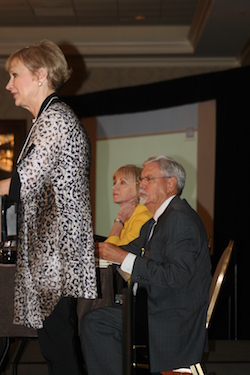While Gov. Rick Perry was in California this week attempting to woo insurance, high tech and film industry leaders to the Lone Star State’s business-friendly, low-tax environment, I’ll bet one thing he didn’t mention is the elephant in the room: that Texas ranks last in access to health care. That might be of some concern to employers.

Jim Willmann, JD, Texas Nurses Association director of governmental affairs, listens while Elizabeth Sjoberg, RN, JD, associate general counsel of the Texas Hospital Association, speaks at a legislative hearing. Kathy Thomas, MN, RN, FAAN, executive director of the Texas Board of Nursing, sits at Jim's right. Photo courtesy of the Texas Nurses Association.
Something happened last week, though, that offers a glimmer of hope to pull us a little further up from the bottom of the heap. Sen. Jane Nelson, R-Flower Mound (chair of the Senate Health and Human Services Committee) and Rep. Lois Kolkhorst, R-Brenham (chair of the House Public Health Committee) filed legislation to loosen the tight restrictions on the scope of practice and prescriptive power of advanced practice registered nurses and physician assistants.
For these providers to order drugs or devices, the requirement for on-site physician supervision will be replaced with periodic face-to-face meetings; the number of advanced practice nurses or PAs to whom a physician can delegate prescriptive authority will be nearly doubled; and coordination among the boards of nursing, medicine and physician assistants will be improved.
The many years of states’ struggle with APN scope of practice has led to legislation that is unduly restrictive and perpetually contradictory. In 2012, 18 states and the District of Columbia allowed advanced practice registered nurses (nurses with master’s degrees and advanced training) to see patients, make basic diagnoses and write prescriptions without a doctor’s involvement. Other states allow them to practice in loose collaboration with physicians. In Texas, nurse practitioners are allowed to practice in clinics and offices only if they have formally been delegated such duties by a doctor.
It seems strange that on military bases in Texas nurse practitioners and physician assistants practice independently of doctors, but off base, these same practitioners find their powers dramatically restricted. This despite being studied up one side and down the other (unlike physicians) with consistent findings that within their areas of competence the care provided by nurse practitioners was equivalent to that of doctors and their actually scoring higher on communication and patient satisfaction.
Attorney Jim Willmann, general counsel for the Texas Nurses Association since 1977, is a veteran of the drug wars. He’s a patient man. He goes about his work researching, educating, negotiating and writing bill language in his calm, soft-spoken manner and has earned the trust of legislators as well as the medicine and hospital lobbies. Every session (and during the Winkler County nurses imbroglio) he helps me accept the world in Texas as it is, not as I would have it.
Willmann notes that the few gains made by advanced practice nurses have been shaped by the confluence of external events with strong legislative leadership. In 1981, former senators Chet Brooks and Carlos Truán pressed an agreement among medicine, nursing and pharmacy to allow nurses to administer and provide, through standing delegation orders, birth control pills and treatment for sexually transmitted diseases in clinics.
In 1989, a significant funding cutback of the federally qualified health centers resulted in a crisis of cutting services if only physicians could prescribe. Brooks and Truán forged an agreement among medicine, nursing and other parties giving advanced practice nurses the power to prescribe in sites serving medically underserved populations.
In 1995, former Rep. Hugo Berlanga with support from Senator Judith Zaffirini, D-Laredo, shepherded an agreement whereby advanced practice nurses could prescribe in a variety of settings including physician primary practice sites and facility-based practices.
In 2003, nurses were allowed to prescribe controlled substances, and the Medicaid reimbursement rate was increased from 85 to 92 percent of the physician’s fee.
In neonatal intensive care, I’ve worked alongside neonatal nurse practitioners for 20 years. They’re smart. They know their limits. They are good at what they do. They will ask if they don’t know something. They talk to the families and listen. They want to take care of the babies and their families, not just fix the prematurity.
More than 521 advanced practice RNs and PAs are credentialed and practicing at the Seton Healthcare Family. Seton employs 174 and 347 are employed by private physicians. The business case is obvious: They’re natural partners with physicians, but cost far less, and you get high-quality care and patient satisfaction.
This session, facing a serious shortage of primary care physicians and with hopefully millions more Texans becoming insured with the Affordable Care Act, it’s all hands on deck. There’s no doubt Nelson’s and Kolkhorst’s legislation will improve access to health care.

 Austin, Texas
Austin, Texas